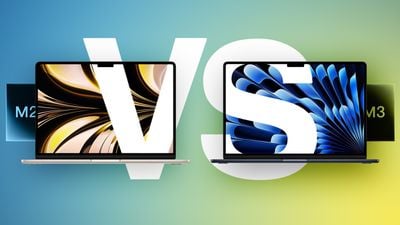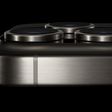Apple today brought the MacBook Air up to date with its latest-generation Apple silicon. The company has reworked the lineup and its pricing, phasing out the M1 machine from 2020 and discontinuing the 15-inch M2 MacBook Air introduced in June 2023, so which model should you buy?

The 2024 MacBook Air is available in 13.6- and 15.3-inch display sizes just like its predecessor, with the smaller model starting at $1,099 and the larger model starting at $1,299. The 13.6-inch MacBook Air with the M2 chip from 2022 remains in the lineup, now at a price of $999. This means that buyers have the choice between the 2022 MacBook Air, its 2024 successor, and a big-screen variant of the 2024 model. It is also worth remembering that it is possible to shave at least $100 off the price of a new MacBook Air directly from Apple with education pricing.
Read on to find out about all of the differences between the M2 and M3 MacBook Air models to help you decide which model is best for you, as well as if it may be worth upgrading.
M2 vs. M3 Chip
The main upgrade offered by the 2024 MacBook Air models is the M3 chip. In benchmark tests, the M3 outperforms the M2 by about 17% in single-core tasks and approximately 21% in multi-core tasks. In GPU performance measured by Metal benchmarks, the M3 exhibits a notable improvement of around 15% over the M2.
| M2 Chip | M3 Chip |
|---|---|
| Based on A15 Bionic chip from iPhone 13 (2021) | Based on A17 Pro chip from iPhone 15 Pro (2023) |
| Enhanced 5nm node (N5P) | 3nm node (N3B) |
| 20 billion transistors | 25 billion transistors |
| 3.49 GHz CPU clock speed | 4.05 GHz CPU clock speed |
| Neural Engine | 15% faster Neural Engine |
| Support for AV1 decode | |
| New GPU architecture | |
| Dynamic Caching | |
| Hardware-accelerated ray tracing | |
| Hardware-accelerated mesh shading |
The M3 chip introduces an all-new GPU architecture. This architecture includes Dynamic Caching, a breakthrough feature that optimizes GPU memory allocation and utilization, adapting in real-time to varying task demands. This enhancement not only boosts graphics performance for intensive applications but also bolsters the chip's overall energy efficiency. This is particularly beneficial for graphics-heavy tasks like advanced video editing, 3D rendering, and gaming. It also features support for AV1 video decode to provide more efficient and higher-quality video from streaming services.
Despite similarities in the 16-core Neural Engine between the M2 and M3, the M3's adoption of a 3nm fabrication process leads to more efficient execution of machine learning and AI tasks. Additionally, the M3 maintains up to 24GB of unified memory, just like the M2, but leverages the new process for more efficient memory bandwidth utilization.
One other notable difference between the M2 and M3 chips is their energy efficiency. The 3nm fabrication process enables the M3 to achieve higher performance without a proportional increase in power consumption, making the chip particularly appealing for laptop users who value a balance between power and battery life.
Overall, the M3 chip is a considerable upgrade from the M2, distinguished by its higher transistor count, improved performance in CPU and GPU tasks, and superior energy efficiency. While the M3 offers clear advancements, the extent of its superiority does not necessitate an immediate upgrade for current M2 users, especially if their existing workflows are still completed comfortably. For new buyers or those upgrading from older models, the M3's improvements in performance and efficiency will be much more pronounced.
Other Differences
There are a number of other notable differences between the two MacBook Air generations beyond their chips. While these upgrades are fairly small, they are worth bearing in mind when contemplating whether to get the latest model.
| M2 MacBook Air (2022 and 2023) | M3 MacBook Air (2024) |
|---|---|
| Available with 13.6-inch display only, 15.3-inch model discontinued | Available with both 13.6- and 15.3-inch display size options |
| Support for one external display | Support for up to two external displays when the lid is closed |
| Voice Isolation and Wide Spectrum microphone modes | |
| Enhanced voice clarity in audio and video calls | |
| Wi-Fi 6 support | Wi-Fi 6E support |
| Anodization seal to reduce fingerprints with Midnight finish | |
| Starts at $999 | Starts at $1,099 |
Final Thoughts
Overall, the M3 MacBook Air is a minor upgrade over its predecessor, largely focusing on enhanced performance rather than new capabilities. Its main target audience is those who have an older MacBook Air, such as an M1 or Intel-based model, or no MacBook Air at all.
Unless you can leverage the specific advantages of the M3 chip and require maximum performance from its highly portable form factor, it is likely not worth buying the M3 MacBook Air over the M2 MacBook Air for most users. However, if future-proofing is a major priority because you tend to keep your computer for many years, the extra $100 to get the latest model will probably be warranted. The M3 model's support for two external displays may also justifiably swing your buying decision if you have multiple monitors.
If you plan to buy a new MacBook Air from Apple and want the larger, 15.3-inch model, then the latest M3 model is your only option as the M2 15.3-inch machine has now been discontinued. That being said, the M2 15.3-inch MacBook Air is still readily available second-hand, refurbished, and from third-party retailers for prices well below the $1,299 price of the latest model. If you want the larger model, it may be worth seeking out one of these deals on an M2 model before opting for the latest M3 machine directly from Apple.
It is certainly not worth upgrading from the M2 to the M3 MacBook Air for the overwhelming majority of customers. Upgrading from an M2 13-inch MacBook Air to an M3 15-inch MacBook Air may be more justifiable owing to the display size increase, but there is little that the latest generation meaningfully offers over its predecessor.





 ('https://www.macrumors.com/guide/m2-vs-m3-macbook-air/')
('https://www.macrumors.com/guide/m2-vs-m3-macbook-air/')












